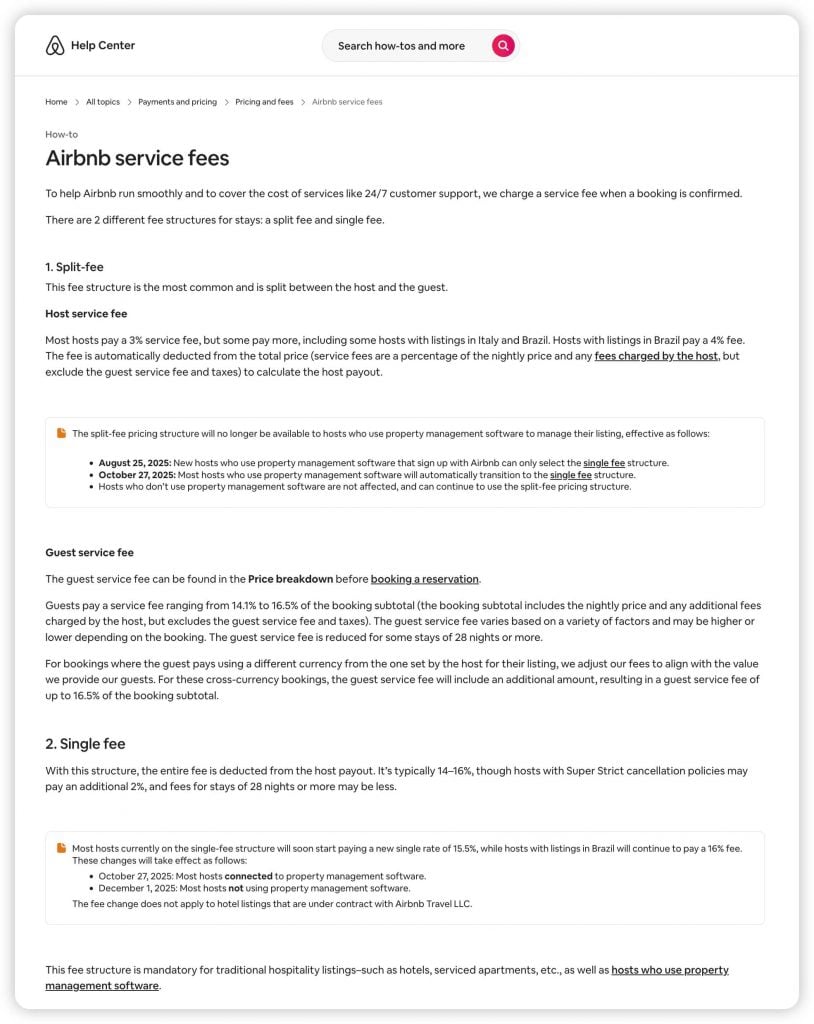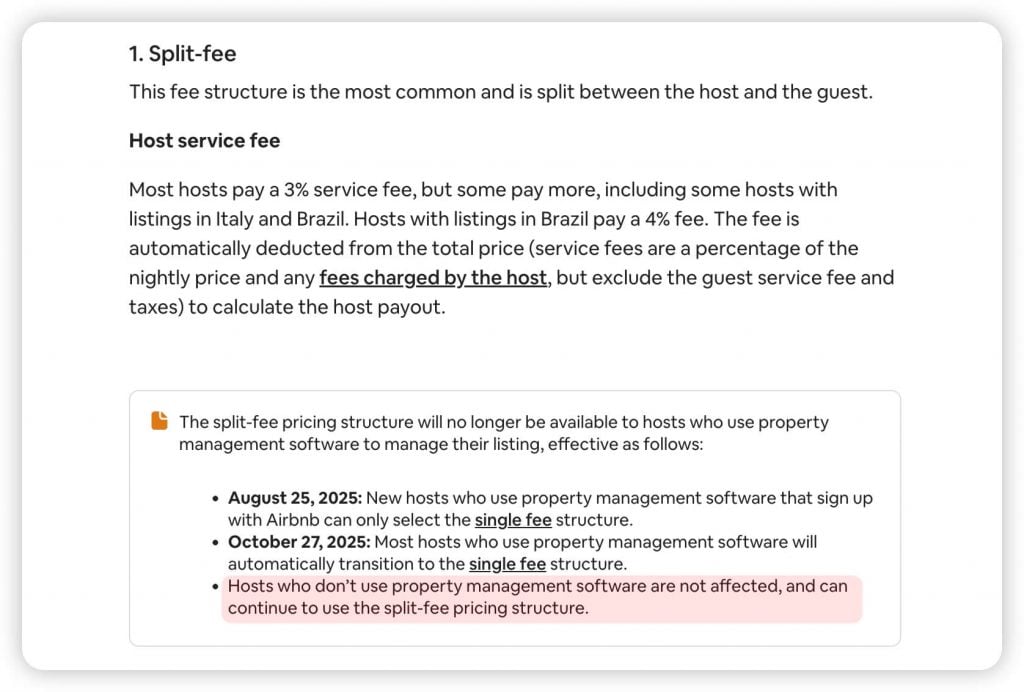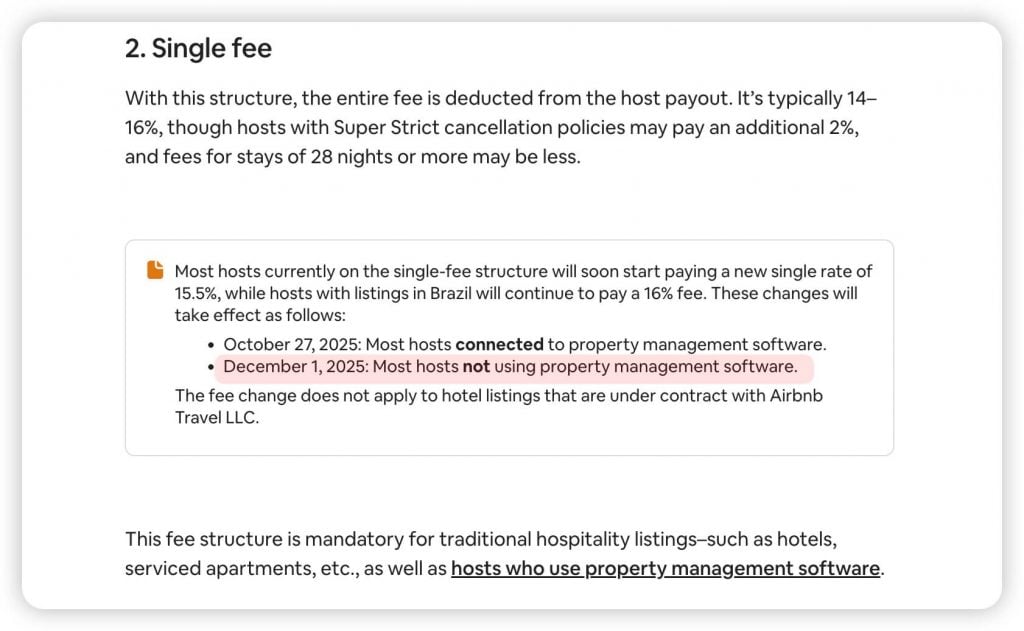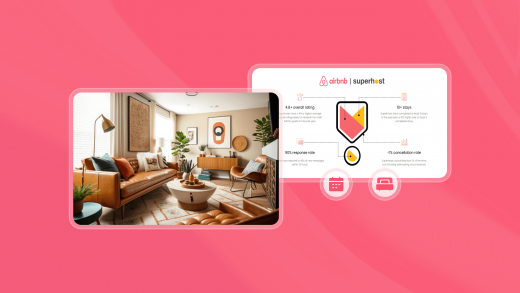In mid-August 2025, Airbnb made a significant change to its fee structure, rebranding the previous “Host-only fee” as the “Airbnb single fee”, along with several other adjustments, which sparked widespread discussions across social media and the Airbnb host community.
Many hosts are concerned that these changes could negatively impact their profits. Key questions being raised include:
- Will the increased fee affect booking rates and overall profitability?
- Is Airbnb enforcing this new single fee structure across all listings?
- Does the single fee benefit or harm hosts, and how to choose?
Are these concerns valid? Let’s dive in and take a closer look at Airbnb’s latest fee policy.
What is Airbnb’s Latest Fee Policy?
Airbnb recently revised its new fee structure, introducing the Airbnb single fee as a replacement for the previous Host-only fee. The key difference is in how the service fee is applied, and it impacts hosts differently based on their listing setup.
Split-Fee
In this model, most hosts paid a 3% service fee, although this rate could vary depending on location (e.g., 4% in Brazil).
And, the guest also pays a separate service fee, which could range between 14.1% and 16.5%, depending on various factors.
Single fee
This means the entire service fee will be deducted from the host’s payout, usually 15.5%.
Notably, hosts with Super Strict cancellation policies may face an additional 2% fee, while long-term stays (28 days or more) might incur a lower fee.
For traditional hospitality listings, such as hotels or serviced apartments, the Airbnb single fee will become mandatory, as well as for hosts who rely on property management software.

What Changes Has Airbnb Made to Host Fees?
1. Change in Naming
The most obvious change is the renaming of the fee structures.
Since the summer of 2020, Airbnb has had two similar fee structures: the Split fee structure and the Host-only fee structure (also known as the simplified fee structure).
Now, the new Single fee replaces the Host-only fee. This new term reflects the shift in how fees are calculated and deducted from the host’s payout.
2. Changes in Applicability
In the past, certain exceptions applied to the Host-only fee structure. For instance, hosts with properties located in countries like the United States, Canada, the Bahamas, Mexico, Argentina, Taiwan or Uruguay could still opt for the split fee structure if they used vacation rental management software (PMS).
Now, the policy is clear: Most hosts using PMS will be required to adopt the Airbnb Single fee structure. This is a mandatory transition, irrespective of the location of the listing.
3. Fee Percentage Changes
The changes in fee percentages under the new Airbnb fee structure are as follows:
- Under the previous Host-only fee structure, hosts typically paid around 15%. This has now increased slightly to 15.5% with the new Airbnb Single fee structure.
- Under the “split fee” structure, most hosts were paying a 3% to 5% service fee. This is now replaced by a fixed 3% service fee for hosts, though some hosts in countries like Italy and Brazil may still pay higher fees.
- The guest service fee used to range between 11% to 12% of the booking subtotal. Now, it has increased to 14.1% to 16.5%.
Comparison: Previous vs. Current Airbnb Fee Structure
| Fee Category | Previous (Before August 2025) | Current (After August 2025) |
|---|---|---|
| Split Fee for Hosts | 3%-5% | 3% |
| Split Fee for Guests | 11% to 12% | 14.1% to 16.5% |
| Single Fee (Host-only Fee) | 15% | 15.5% |
| Single Fee Applicability | Most hosts using PMS (Except properties located in the United States, Canada, the Bahamas, Mexico, Argentina, Taiwan, or Uruguay) | Most hosts using PMS |
Why Has Airbnb’s Fee Change Sparked Such a Debate?
1. A Significant Increase in Fees
Under the split-fee structure, guests were paying a service fee ranging from 14.1% to 16.5%. When combined with the host’s portion of 3%, Airbnb was effectively charging between 17.1% and 19.5% of each booking’s total.
Under the Single Fee structure, hosts were initially paying 15%, but this has now increased to 15.5%.
This hike is certainly frustrating for hosts, even though Airbnb has provided some buffer time for the transition. The increase in fees directly impacts hosts’ pricing strategies and profitability, and indirectly affects the competitiveness and booking rates of their listings.
2. Ambiguity in the Language
Airbnb’s new rules appear to be quite detailed and thorough, with a clear breakdown of everything hosts need to know. However, some of the explanations are vague and use ambiguous language, leading to confusion among many hosts.
For instance, Airbnb frequently uses the term “most hosts,” but this raises a common question: Who exactly does “most hosts” refer to? Hosts want to know, “Am I included in the ‘most’ group, or will I be excluded?”
Actually, in the past, Airbnb used similar terminology, which can be understood as a way for the platform to leave room for interpretation. This allows them to handle potential backlash more effectively.
For example, when Airbnb first introduced the Host-only fee in 2020, it was initially rolled out globally. However, maybe due to strong requests from certain regions, Airbnb had to provide exceptions for hosts in countries like the U.S., Canada, the Bahamas, Mexico, Argentina, Taiwan, and Uruguay.
3. Contradictory Statements
Airbnb’s documentation includes two particular disclaimers that have caused confusion among hosts:
The first statement reads: “Hosts who don’t use property management software are not affected, and can continue to use the split-fee pricing structure.”

However, the second statement reads: These changes will take effect for “Most hosts not using property management software starting December 1, 2025.”

These two statements seem to contradict each other, leaving hosts who don’t use property management software uncertain about what the real policy is.
In reality, Airbnb’s intention seems to be clarified in the beginning of the second paragraph, where it mentions: “Most hosts currently on the single-fee structure will soon start paying a new single rate.” In other words, hosts who previously opted for the Host-only fee structure, regardless of whether or not they use property management software, will see their fee increase to 15.5%.
From my understanding, Airbnb is not saying that all hosts will be forced to switch to the Single Fee structure starting December 1, 2025, but rather that those previously using the Host-only fee will experience the fee increase.
How Should Hosts Respond to Airbnb’s New Fee Policy?
In my view, this change by Airbnb is neither a huge benefit nor a significant detriment.
As Airbnb expands its services and infrastructure, the operational costs inevitably increase. To sustain business growth, Airbnb may need to raise its fees slightly. When compared to other platforms, Airbnb’s fees remain relatively moderate — between 15.5% and 19.5% per booking, which is higher than Vrbo (15%) but comparable to Booking.com (18%).
For hosts who don’t use property management software, the increase in guest service fees will be more noticeable. This will likely force them to reconsider their pricing strategy. If they increase prices, the guest service fee also rises, which could lead to fewer bookings. On the other hand, lowering prices reduces their payout, even though the guest’s payment stays the same.
For Airbnb hosts using property management software, particularly those in North America, the policy shift is also significant. Previously, they could choose between the two fee structures, but now they may have to accept the full 15.5% fee, just like all other global hosts.
However,
As we’ve pointed out in previous articles, while the Airbnb Host-only fee (now the Single fee) might seem like a higher cost for hosts using PMS, the reality is that this change offers several benefits:
- The overall fee percentage is still lower than other major OTAs, making it one of the more competitive platforms in terms of fee structure.
- Guests don’t need to pay an extra fee, which encourages bookings. Unexpected service fees during checkout can often deter potential guests.
- Hosts can maintain a consistent pricing strategy across various platforms, simplifying cost-benefit calculations.
Most importantly, for professional hosts managing listings across multiple platforms, using PMS is practically indispensable. For just a few dollars per month, tools like Hostex streamline multi-platform management, reducing administrative costs while boosting overall efficiency.

This is just my personal perspective, and I’d love to hear your thoughts. Feel free to join the conversation in the comments!



